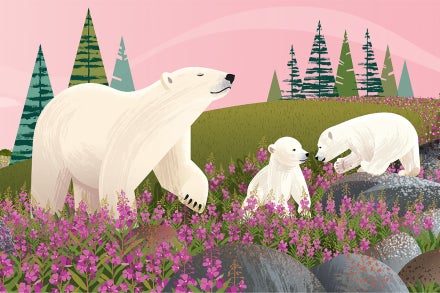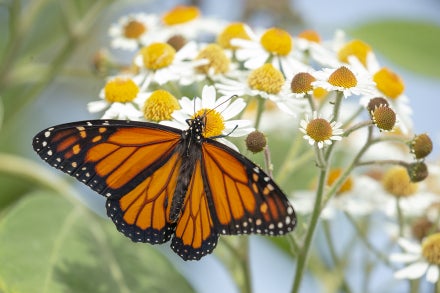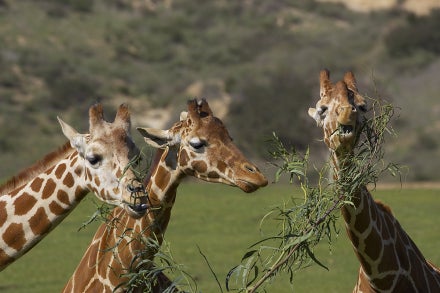Image

Zoo InternQuest is a seven-week career exploration program for San Diego County high school juniors and seniors. Students have the unique opportunity to meet professionals working for the San Diego Zoo, Safari Park, and Institute for Conservation Research, learn about their jobs and then blog about their experience online. Follow their adventures here on the Zoo’s Website!
 Interns spent time with Kim Livingstone, an Animal Care Supervisor for the Primate Department at the San Diego Zoo. Kim has been working at the San Diego Zoo since 1988, and has been working with the primates since 1993. Before she worked with the San Diego Zoo, Ms. Livingstone was part of the Miami Metro Zoo with the Ornithology Department. As a keeper for Miami’s Ornithology Department, Ms. Livingstone primarily cared for the zoo’s collection of birds. The Miami Metro Zoo sent her to Ecuador for three months to collect birds of paradise in areas that had been affected by deforestation. While on this trip, Ms. Livingstone first met researchers from the San Diego Zoo. Ms. Livingstone enjoyed her time with the San Diego Zoo’s team so much that she wrote a letter to the San Diego Zoo asking if they had any openings and the Curator of Birds gave her a job in 1988. She ended up getting the job she really wanted thanks to her tenacity. Ms. Livingstone went out of her way to pursue her life goals; she wanted to tell her story in hopes that we will learn from her and reach for what we want in life.
Ms. Livingstone first took us the bonobo exhibit, where we overlooked the troop of nine apes. Ms. Livingstone works closely with the bonobos and was able to call out to each of them by name. These close relatives of the chimpanzee are very intelligent and very social animals. Given their immense intelligence and highly complex social structure, Ms. Livingstone has enjoyed learning all of their distinct personalities. She seemed to take pleasure in talking to them and the bonobos in turn responded to her voice and even seemed to understand what she was saying. Humans are actually equally related to bonobos and chimpanzees, but bonobos are often overlooked by the public because not much is known about this rare and elusive species. In fact, they weren’t even recognized as a different species until the 1970’s!
Next, interns stopped by one of the Zoo’s many aviaries, which as of recently, is actually home to two golden-headed lion tamarins. All of the birds in the aviary are from South America, so it made sense to include a pair of monkeys from the same region. The Zoo is very careful to minimize contact with the tamarins and actually have a zero-contact policy in place for all incoming visitors and primates. It is very important not to touch the monkeys because they are susceptible to many of the same diseases that afflict people. Given this high risk, the Zoo is very strict when enforcing these policies. In the aviary, the conversation turned to the unexpected topic of consumer awareness. Ms. Livingstone talked to the interns about how a customer needs to be aware of the ecological cost of creating the consumer product, which can often be detrimental to many endangered and threatened species worldwide. The biggest factor she talked about was the transportation of consumer products. Shipping over long distances uses large amounts of fuel, which contributes to global warming. Ms. Livingstone told us how important it was to buy locally to help the environment; anyone can buy fruit from their local farmers market or buy products made in the USA. Simple actions like this can drastically lower your carbon footprint and the overall amount of pollution you produce in your life.
Ms. Livingstone’s presentation gave us so much more than expected. Her career is a perfect example of her first lesson: reach for what you want in life. Ms. Livingstone started off at the Miami Metro Zoo as a volunteer. She blazed her own trail to achieve her goals, and she is happier because of it. Her second lesson is applicable in a much simpler way: by buying products made and produced locally, you can help the environment in your own way. Ms. Livingstone managed to turn this primate presentation into something much bigger and we can all learn something from her experiences.
Ethan, Real World Team
Week Two, Fall Season 2016
Interns spent time with Kim Livingstone, an Animal Care Supervisor for the Primate Department at the San Diego Zoo. Kim has been working at the San Diego Zoo since 1988, and has been working with the primates since 1993. Before she worked with the San Diego Zoo, Ms. Livingstone was part of the Miami Metro Zoo with the Ornithology Department. As a keeper for Miami’s Ornithology Department, Ms. Livingstone primarily cared for the zoo’s collection of birds. The Miami Metro Zoo sent her to Ecuador for three months to collect birds of paradise in areas that had been affected by deforestation. While on this trip, Ms. Livingstone first met researchers from the San Diego Zoo. Ms. Livingstone enjoyed her time with the San Diego Zoo’s team so much that she wrote a letter to the San Diego Zoo asking if they had any openings and the Curator of Birds gave her a job in 1988. She ended up getting the job she really wanted thanks to her tenacity. Ms. Livingstone went out of her way to pursue her life goals; she wanted to tell her story in hopes that we will learn from her and reach for what we want in life.
Ms. Livingstone first took us the bonobo exhibit, where we overlooked the troop of nine apes. Ms. Livingstone works closely with the bonobos and was able to call out to each of them by name. These close relatives of the chimpanzee are very intelligent and very social animals. Given their immense intelligence and highly complex social structure, Ms. Livingstone has enjoyed learning all of their distinct personalities. She seemed to take pleasure in talking to them and the bonobos in turn responded to her voice and even seemed to understand what she was saying. Humans are actually equally related to bonobos and chimpanzees, but bonobos are often overlooked by the public because not much is known about this rare and elusive species. In fact, they weren’t even recognized as a different species until the 1970’s!
Next, interns stopped by one of the Zoo’s many aviaries, which as of recently, is actually home to two golden-headed lion tamarins. All of the birds in the aviary are from South America, so it made sense to include a pair of monkeys from the same region. The Zoo is very careful to minimize contact with the tamarins and actually have a zero-contact policy in place for all incoming visitors and primates. It is very important not to touch the monkeys because they are susceptible to many of the same diseases that afflict people. Given this high risk, the Zoo is very strict when enforcing these policies. In the aviary, the conversation turned to the unexpected topic of consumer awareness. Ms. Livingstone talked to the interns about how a customer needs to be aware of the ecological cost of creating the consumer product, which can often be detrimental to many endangered and threatened species worldwide. The biggest factor she talked about was the transportation of consumer products. Shipping over long distances uses large amounts of fuel, which contributes to global warming. Ms. Livingstone told us how important it was to buy locally to help the environment; anyone can buy fruit from their local farmers market or buy products made in the USA. Simple actions like this can drastically lower your carbon footprint and the overall amount of pollution you produce in your life.
Ms. Livingstone’s presentation gave us so much more than expected. Her career is a perfect example of her first lesson: reach for what you want in life. Ms. Livingstone started off at the Miami Metro Zoo as a volunteer. She blazed her own trail to achieve her goals, and she is happier because of it. Her second lesson is applicable in a much simpler way: by buying products made and produced locally, you can help the environment in your own way. Ms. Livingstone managed to turn this primate presentation into something much bigger and we can all learn something from her experiences.
Ethan, Real World Team
Week Two, Fall Season 2016
 Interns spent time with Kim Livingstone, an Animal Care Supervisor for the Primate Department at the San Diego Zoo. Kim has been working at the San Diego Zoo since 1988, and has been working with the primates since 1993. Before she worked with the San Diego Zoo, Ms. Livingstone was part of the Miami Metro Zoo with the Ornithology Department. As a keeper for Miami’s Ornithology Department, Ms. Livingstone primarily cared for the zoo’s collection of birds. The Miami Metro Zoo sent her to Ecuador for three months to collect birds of paradise in areas that had been affected by deforestation. While on this trip, Ms. Livingstone first met researchers from the San Diego Zoo. Ms. Livingstone enjoyed her time with the San Diego Zoo’s team so much that she wrote a letter to the San Diego Zoo asking if they had any openings and the Curator of Birds gave her a job in 1988. She ended up getting the job she really wanted thanks to her tenacity. Ms. Livingstone went out of her way to pursue her life goals; she wanted to tell her story in hopes that we will learn from her and reach for what we want in life.
Ms. Livingstone first took us the bonobo exhibit, where we overlooked the troop of nine apes. Ms. Livingstone works closely with the bonobos and was able to call out to each of them by name. These close relatives of the chimpanzee are very intelligent and very social animals. Given their immense intelligence and highly complex social structure, Ms. Livingstone has enjoyed learning all of their distinct personalities. She seemed to take pleasure in talking to them and the bonobos in turn responded to her voice and even seemed to understand what she was saying. Humans are actually equally related to bonobos and chimpanzees, but bonobos are often overlooked by the public because not much is known about this rare and elusive species. In fact, they weren’t even recognized as a different species until the 1970’s!
Next, interns stopped by one of the Zoo’s many aviaries, which as of recently, is actually home to two golden-headed lion tamarins. All of the birds in the aviary are from South America, so it made sense to include a pair of monkeys from the same region. The Zoo is very careful to minimize contact with the tamarins and actually have a zero-contact policy in place for all incoming visitors and primates. It is very important not to touch the monkeys because they are susceptible to many of the same diseases that afflict people. Given this high risk, the Zoo is very strict when enforcing these policies. In the aviary, the conversation turned to the unexpected topic of consumer awareness. Ms. Livingstone talked to the interns about how a customer needs to be aware of the ecological cost of creating the consumer product, which can often be detrimental to many endangered and threatened species worldwide. The biggest factor she talked about was the transportation of consumer products. Shipping over long distances uses large amounts of fuel, which contributes to global warming. Ms. Livingstone told us how important it was to buy locally to help the environment; anyone can buy fruit from their local farmers market or buy products made in the USA. Simple actions like this can drastically lower your carbon footprint and the overall amount of pollution you produce in your life.
Ms. Livingstone’s presentation gave us so much more than expected. Her career is a perfect example of her first lesson: reach for what you want in life. Ms. Livingstone started off at the Miami Metro Zoo as a volunteer. She blazed her own trail to achieve her goals, and she is happier because of it. Her second lesson is applicable in a much simpler way: by buying products made and produced locally, you can help the environment in your own way. Ms. Livingstone managed to turn this primate presentation into something much bigger and we can all learn something from her experiences.
Ethan, Real World Team
Week Two, Fall Season 2016
Interns spent time with Kim Livingstone, an Animal Care Supervisor for the Primate Department at the San Diego Zoo. Kim has been working at the San Diego Zoo since 1988, and has been working with the primates since 1993. Before she worked with the San Diego Zoo, Ms. Livingstone was part of the Miami Metro Zoo with the Ornithology Department. As a keeper for Miami’s Ornithology Department, Ms. Livingstone primarily cared for the zoo’s collection of birds. The Miami Metro Zoo sent her to Ecuador for three months to collect birds of paradise in areas that had been affected by deforestation. While on this trip, Ms. Livingstone first met researchers from the San Diego Zoo. Ms. Livingstone enjoyed her time with the San Diego Zoo’s team so much that she wrote a letter to the San Diego Zoo asking if they had any openings and the Curator of Birds gave her a job in 1988. She ended up getting the job she really wanted thanks to her tenacity. Ms. Livingstone went out of her way to pursue her life goals; she wanted to tell her story in hopes that we will learn from her and reach for what we want in life.
Ms. Livingstone first took us the bonobo exhibit, where we overlooked the troop of nine apes. Ms. Livingstone works closely with the bonobos and was able to call out to each of them by name. These close relatives of the chimpanzee are very intelligent and very social animals. Given their immense intelligence and highly complex social structure, Ms. Livingstone has enjoyed learning all of their distinct personalities. She seemed to take pleasure in talking to them and the bonobos in turn responded to her voice and even seemed to understand what she was saying. Humans are actually equally related to bonobos and chimpanzees, but bonobos are often overlooked by the public because not much is known about this rare and elusive species. In fact, they weren’t even recognized as a different species until the 1970’s!
Next, interns stopped by one of the Zoo’s many aviaries, which as of recently, is actually home to two golden-headed lion tamarins. All of the birds in the aviary are from South America, so it made sense to include a pair of monkeys from the same region. The Zoo is very careful to minimize contact with the tamarins and actually have a zero-contact policy in place for all incoming visitors and primates. It is very important not to touch the monkeys because they are susceptible to many of the same diseases that afflict people. Given this high risk, the Zoo is very strict when enforcing these policies. In the aviary, the conversation turned to the unexpected topic of consumer awareness. Ms. Livingstone talked to the interns about how a customer needs to be aware of the ecological cost of creating the consumer product, which can often be detrimental to many endangered and threatened species worldwide. The biggest factor she talked about was the transportation of consumer products. Shipping over long distances uses large amounts of fuel, which contributes to global warming. Ms. Livingstone told us how important it was to buy locally to help the environment; anyone can buy fruit from their local farmers market or buy products made in the USA. Simple actions like this can drastically lower your carbon footprint and the overall amount of pollution you produce in your life.
Ms. Livingstone’s presentation gave us so much more than expected. Her career is a perfect example of her first lesson: reach for what you want in life. Ms. Livingstone started off at the Miami Metro Zoo as a volunteer. She blazed her own trail to achieve her goals, and she is happier because of it. Her second lesson is applicable in a much simpler way: by buying products made and produced locally, you can help the environment in your own way. Ms. Livingstone managed to turn this primate presentation into something much bigger and we can all learn something from her experiences.
Ethan, Real World Team
Week Two, Fall Season 2016



